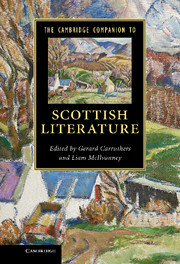Book contents
- Frontmatter
- Contents
- Notes on Contributors
- Acknowledgements
- Chronology
- Introduction
- 1 Scottish Literature before Scottish Literature
- 2 The Medieval Period
- 3 Reformation and Renaissance
- 4 The Aftermath of Union
- 5 Robert Burns
- 6 Enlightenment, Romanticism and the Scottish Canon
- 7 Scott and the Historical Novel
- 8 The Gaelic Tradition
- 9 Scottish Gothic
- 10 Victorian Scottish Literature
- 11 Robert Louis Stevenson
- 12 Hugh MacDiarmid and the Scottish Renaissance
- 13 Popular Fiction
- 14 Muriel Spark
- 15 The Glasgow Novel
- 16 ‘What is the language using us for?’
- 17 The Emergence of Scottish Studies
- 18 Otherworlds
- 19 Scottish Literature in Diaspora
- Index
- References
1 - Scottish Literature before Scottish Literature
Published online by Cambridge University Press: 05 January 2013
- Frontmatter
- Contents
- Notes on Contributors
- Acknowledgements
- Chronology
- Introduction
- 1 Scottish Literature before Scottish Literature
- 2 The Medieval Period
- 3 Reformation and Renaissance
- 4 The Aftermath of Union
- 5 Robert Burns
- 6 Enlightenment, Romanticism and the Scottish Canon
- 7 Scott and the Historical Novel
- 8 The Gaelic Tradition
- 9 Scottish Gothic
- 10 Victorian Scottish Literature
- 11 Robert Louis Stevenson
- 12 Hugh MacDiarmid and the Scottish Renaissance
- 13 Popular Fiction
- 14 Muriel Spark
- 15 The Glasgow Novel
- 16 ‘What is the language using us for?’
- 17 The Emergence of Scottish Studies
- 18 Otherworlds
- 19 Scottish Literature in Diaspora
- Index
- References
Summary
Knowing when to start any discussion of Scottish literature, and where to mark its boundaries, has proven increasingly problematic over the past few decades. ‘Scottish Literature’, as a subject of academic enquiry, emerged primarily out of the sister discipline of ‘English Literature’, and as such has only in recent years begun to confront two significant blind spots resulting from that evolution. The first, not directly the concern of this chapter, is the virtual exclusion of material in Scottish Gaelic from the study of Scottish Literature for much of the twentieth century. The second, the topic of this chapter, is the exclusion of nearly eight centuries of literature from and about Scotland from consideration, the centuries before the middle of the fourteenth century. Scottish literature, whether we think here of its representation in anthologies or literary histories, has often been seen to begin with John Barbour (c. 1320–95) or his contemporaries. This is because theirs is the earliest substantial work we have preserved in the language of Older Scots, and thus may be seen as ancestral to the anglophone literatures of modern Scotland, those in Scots and English. Even the otherwise linguistically ecumenical Hugh MacDiarmid perpetuated this state of affairs, describing the short elegy ‘When Alexander our King was Dead’ as ‘the earliest extant piece of Scottish verse’, and only in his notes continuing this thought more subversively: ‘The earliest extant that is to say except in Gaelic’.
- Type
- Chapter
- Information
- The Cambridge Companion to Scottish Literature , pp. 13 - 26Publisher: Cambridge University PressPrint publication year: 2012
References
- 3
- Cited by

